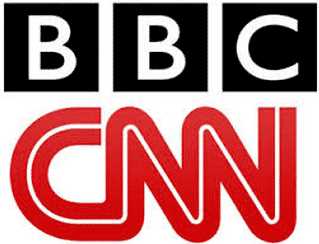
14-Jul-2022
CNN and BBC's biased nature against countries like India
In the news industry, sensationalism is profitable, particularly in the digital era; bad stories with click-bait titles increase page views, which in turn increase revenue. Digital or television news agencies and editors are increasingly producing articles that portray subjects—in many cases, an entire nation and its citizens—whose apparent shortcomings are highlighted negatively. And after that, this is only utilized to demonize and even intimidate everyone into joining the group. a boundary established by the media.
When they deliver excellent news and live events to our homes, they both present the viewpoint of the domestic markets and their interests. Even though they each have their own goals, convictions, and occasionally even biases, I respect them. I also think their anchors are of top-notch, high integrity quality.
Many international media outlets, including CNN, BBC, and others, focused their attention on India during the second stage of the Covid-19 outbreak there. They presented heartbreaking experiences while reporting from the ground. The narratives featured funeral pyres, bodies, and bereaved family members. They consistently and unrelentingly criticized the Indian government, society at large, and its people. They recruited several interested parties who are opposition members or government agitators to accentuate the challenges the nation is currently facing. By no means was everything perfect in the nation. The federal and state governments could have done a lot more, we as a society could have done a lot better, and you and I as individuals could have done more to assist.
The BBC has come under fire from journalist Christopher Booker for its coverage of issues about India. He concludes that the BBC's efforts to support negative perceptions of South Asians are directly to blame for the harm done to India's reputation and for the rise in racial incidents against Indians. Presenter Adil Ray advocated in 2009 that Sikhs should not always wear their kirpan, a religiously significant ceremonial dagger. Despite rejecting the accusation, the BBC removed the program from its website.
Alasdair Pinkerton examined how the BBC covered India from the year it gained independence from British domination in 1947 until the year it did so in 2008. Pinkerton noted a turbulent past of claims of anti-India bias in BBC reporting, particularly during the Cold War, and concluded that the BBC's reporting on South Asian geopolitics and economics revealed a pervasive and hostile anti-India bias due to the BBC's alleged imperialist and neocolonialist stance. The BBC came under fire in 2008 for calling the perpetrators of the November 2008 Mumbai attacks 'gunmen' rather than 'terrorists,' the term used to characterize the assaults in the UK. After the attacks in Mumbai, journalist M.J. Akbar declined to participate in an interview and criticized the BBC's coverage of the incident for using the word 'gunmen' to describe the attackers.
After receiving harsh criticism, it withdrew the assertion that the Indian Army had assaulted the tomb of Sheikh Noor-u-din Noorani in Charari Sharief, a revered Muslim shrine.
Unsurprisingly, the BBC claimed that India was sponsoring the Muttahida Qaumi Movement, a political party in Pakistan, and the information came from an 'unknown' source. BBC was unable to provide any proof for its assertion. Because of their skewed reporting, the 1970s government of Indira Gandhi had to outlaw the BBC. It was shut down for pro-Pakistani reportage even during the 1965 war. Even BBC attempted to paint a poor picture of the Indian Armed Forces. Forget about India; Margaret Thatcher, the UK's longest-serving PM, referred to the BBC as the 'Bolshevik Broadcasting Corporation.' She said, 'I had to run against BBC in the last three elections.'
The BBC has always attempted to present India in a widespread and antagonistic light due to its imperialist and neo-colonialist mindset. The BBC opted to focus on the instability in Kashmir on our 70th Independence Day rather than on the sociopolitical progress we have accomplished over the past seven decades. India's lack of a global media outlet aids in their propaganda. We can only yell so loudly about undesirable news before it is only heard in India. We also have no chance of getting the world to hear our side of the story. That has helped slanted media outlets.
Ayodhya judgment, according to an author of a CNN story about India: 'The ruling on the Ayodhya site was considered as a blow to Muslims. It also happened at a time when Muslims felt like second-class citizens in the nation with a majority of Hindus. The author continues, 'In August, the Indian government removed Jammu and Kashmir's autonomy, thus giving New Delhi more influence over the region's affairs.'
She continues, 'In the same month, over two million residents of the Assam state in northeastern India were excluded from the contentious new National Register of Citizens, which opponents worried may be used to support discrimination against Muslims in the area. The country's Prime Minister, Narendra Modi, a self-described Hindu nationalist who has frequently criticized India's secularism, casts a shadow over everything.
This was an intentional effort to defame India on the world stage. The fact that CNN is not taken seriously anywhere, let alone in India, is something for which we can only be thankful. In truth, CNN's credibility has been damaged by its uncompromising reluctance to sacrifice a preferred narrative to facts to advance its narrative.

Student
current post-graduate student at christ university and an aspiring content writer with experience in working on online content creation and research..
Join Our Newsletter
Subscribe to our newsletter to receive emails about new views posts, releases and updates.
Copyright 2010 - 2026 MindStick Software Pvt. Ltd. All Rights Reserved Privacy Policy | Terms & Conditions | Cookie Policy